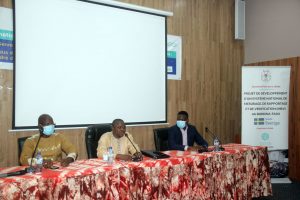Ouagadougou, Burkina Faso, August 25-26, 2020 – Under the aegis of the Burkina Faso Ministry of Environment, Green Economy and Climate Change, the GGGI Burkina Faso Country Office organized a two-day training workshop on August 25-26, 2020. The first day was dedicated to the topic of Gender in the MRV system, on how to mainstream gender in the establishment of an MRV system in Burkina Faso. For the second day, the focus was on the data collection and management systems in the context of greenhouse gas inventory.
The two sessions were launched by Mr. Lamine Ouedraogo, Green Growth Programming Senior Officer for the GGGI Burkina Faso office.
The first session was attended by several representatives from key sectors and ministries involved in the MRV system. In his welcoming words, Mr. Ouedraogo presented the MRV project and emphasized the importance of the Gender in the MRV system.
Mr. Ouedraogo, at the end of his statement, expressed his commitment to GGGI to continue its support to Burkina Faso. After the opening remarks, Mr Galiné Yanon, the Project Coordinator provided a detailed explanation of the MRV system and how the present project will contribute to strengthen the system in Burkina Faso.

Mr Tidiani Ouedraogo, the Gender expert, began the training session which aimed to help participants understand more about the concept of gender in the MRV system and how this approach will contribute to support Burkina Faso’s engagement towards the international community, in the context of the Paris Agreement. During this session, participants worked in groups facilitated by the Expert (Mr. Tidiani). Discussions were mainly around the Understanding of Gender issues in the context of Burkina Faso, how to better consider Gender dimension in MRV System. Several examples were used by the expert to facilitate the working groups.
The second day was dedicated to the data collection process and data management in the MRV system. More than thirty participants from about fifteen ministries and environment-related organizations attended the session. The project coordinator presented the MRV system and proposed structure for Burkina Faso from the first results of the ongoing Rapid Assessment work. The presentation also focused on the importance of data in the MRV system: how we can all contribute to data collection. Mr Yanon ended his presentation mentioning that two key elements are important for MRV effectiveness in Burkina Faso, strong Institutional arrangement and a good data management system.
After the presentation, the rest of the day was dedicated to the training session by Mr Placide Sankar Somé, statistician expert at the National Institute of Statistics and Demography of Burkina Faso (INSD). During his first presentation, Mr. Some focused on the three main resources needed for the implementation of an efficient MRV system: (i) an adequate and functional institutional arrangement, (ii) skilled human resources and (iii) the availability of data. During this session, time had been dedicated to discussions between participants to give them a better understanding of the MRV system. Many recommendations were formulated, with the most important one being to integrate MRV approaches into national institution processes. This recommendation was also found in the Rapid Assessment Aork as one of the key elements to support in the present project.
The MRV project (funded by the Swedish government for 36 months) will be supporting Burkina Faso to meet its engagement defined in its Nationally Determined Contribution document (NDC). The MRV will support the country to better respond to the enhanced transparency framework requirements of the Paris Agreement, specifically focusing on MRV actions including both mitigation and adaptation.